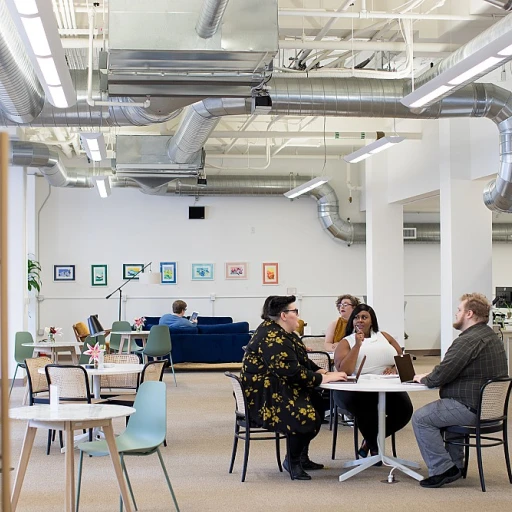
Understanding the Role of a Skills Development Facilitator
The Importance of Skills Development Facilitation in the Workplace
Skills development facilitators (SDF) play a crucial role in bridging the gap between employee skills and organizational needs. In today's fast-paced business environment, companies must ensure their workforce is equipped with the relevant skills necessary for growth and compliance. Facilitators guide the development process by providing advice on skills training programs, helping to plan workplace skills development, and maintaining adherence to compliance requirements such as BEE and SETA. Facilitators assess current skill levels and determine what training needs exist within the organization. This assessment includes aligning skills development programs with the company's goals and crafting a development plan that supports the career development of employees. Through training programs and education, facilitators help employees reach the appropriate NQF level, enhancing their contributions to the company. An effective SDF will establish a strategic skills plan that aligns with both individual learning needs and organizational objectives. This involves creating annual training reports (ATR) and workplace skills plans (WSP) to track progress and results. By fostering continuous learning and development, facilitators contribute to a dynamic and adaptive corporate culture. For more insights on crafting effective goals within an organization, visit Crafting Effective Development Goals for Managers, providing additional guidance for aligning skills development with career progression.Identifying Key Skills for Facilitators
Nurturing Essential Competencies for Success
For skills development facilitators (SDFs) to thrive in their roles, it's crucial that they possess a unique blend of skills and competencies. These are central to fostering effective learning environments and ensuring businesses meet their strategic objectives through comprehensive training programs.- Communication and Interpersonal Skills: Facilitators must excel in communication to clearly convey complex ideas and engage learners. Their ability to interact effectively with diverse teams enhances workplace skills and supports an inclusive organisational culture.
- Empathy and Emotional Intelligence: Understanding the needs of participants and responding to their challenges with empathy is key. This trait aids in building a supportive learning atmosphere, motivating employees, and encouraging participation.
- Analytical and Problem-Solving Skills: SDFs should be adept at analysing training needs and crafting a skills plan that aligns with strategic business goals. Their problem-solving abilities are pivotal in addressing any obstacles that may arise during training sessions.
- Adaptability and Flexibility: The ability to adapt to changing environments and adjust training courses to meet diverse learning needs is essential. This flexibility helps ensure consistent compliance with industry standards set by bodies like ETDP SETA in South Africa.
- Organisational Skills: Efficient planning and execution of development plans require strong organisational capabilities. Facilitators manage annual training schedules, report ATR, plan WSP, and ensure smooth execution of all training activities.
- Technical Proficiency: In an increasingly digital world, SDFs must keep abreast of new technologies and utilize training tools to enhance the effectiveness of courses. Their technical knowledge ensures programs meet NQF levels and align with company objectives.
Strategies for Effective Skills Development
Practical Approaches to Boost Skills Development
Integrating effective strategies for skills development within a company can act as a catalyst for enhancing corporate culture. To ensure your organisation is fostering an environment that prioritizes growth and learning, consider implementing the following actionable techniques:- Customization of Training Programs: Tailor training to meet the unique needs of your workforce. By aligning the skills development plan with specific job roles and employee aspirations, it not only boosts engagement but also supports career development. Thus, consider conducting a comprehensive workplace skills audit to understand the diverse needs of your staff.
- Collaboration with Educational Institutions: Partner with local education providers or leverage existing platforms within South Africa, such as the SETA (Sector Education and Training Authority), to access a wide range of courses and resources. This not only ensures compliance with local regulatory standards but also provides employees with recognised qualifications that enhance their careers.
- Flexible Learning Opportunities: Incorporate various learning formats, such as online modules or in-person workshops, to cater to different learning preferences. Facilitation by a skilled development facilitator (SDF) who can provide expert guidance and advice enhances the effectiveness of these programs.
- Continuous Feedback Mechanisms: Establish a system of regular feedback and evaluations to measure progress and impact effectively. Annual training report, also known as ATR, or evaluation sessions can help in tweaking and refining the education training initiatives. Besides, the training report can serve as a basis for the Plan WSP (Workplace Skills Plan) submission process.
Overcoming Challenges in Skills Development
Tackling Skills Development Roadblocks
One of the most significant challenges faced by skills development facilitators (SDFs) is bridging the gap between the current skill set of employees and the evolving demands of the workplace. Organizations, especially in regions like South Africa, need to adapt to changes in industry standards and technological advancements while adhering to compliance measures laid out by entities like the SETA.- Aligning SDF with Workplace Needs: Companies must ensure that the training programs and courses curated by SDFs meet the practical demands of the workplace. This involves integrating a skills plan that aligns with the organization's objectives. Development facilitators should collaborate with management to create a tailored plan that respects the unique needs of the business context.
- Compliance and BEE Considerations: Compliance, especially in relation to BEE (Black Economic Empowerment) policies, adds a layer of complexity. Facilitators must be adept at navigating these frameworks to ensure that skills development not only serves the employees but also benefits the company in terms of regulatory requirements and societal impact.
- Overcoming Educational Barriers: Addressing disparities in foundational education is crucial. Many workers may lack the basic educational qualifications required for certain competency levels defined by the National Qualifications Framework (NQF Level). Facilitators should design foundational courses to bridge these gaps, thus enabling career development opportunities.
- Resource Allocation: Effective skills development requires adequate resources, from financial investments to time allotment for training. Organizations must prioritize spending and scheduling that allow development facilitators to implement their plans efficiently.
- Resistance to Change: Ingrained workplace habits and resistance to new methods of learning can hinder progress. Facilitators must employ strategies that promote an open mindset towards continual education and skills enhancement. This is where annual training plans and the facilitation of a positive learning culture play a critical role.
Measuring the Impact of Skills Development on Corporate Culture
Evaluating the Impact on Company Culture
In the realm of corporate culture, the significance of skills development cannot be overstated. A carefully planned and executed skills development initiative not only enhances workplace skills but also strengthens the overall company culture. To measure this impact, companies need to adopt a systematic approach. First, it's essential for businesses to establish clear objectives that align with their annual training and development plan. Facilitators, by working closely with the organisation's goals, can provide advice on how to align skills development with career advancement opportunities.Implementing Metrics and Reports
An organisation aiming for effective skills enhancement should implement a robust system to track and report progress. Key performance indicators (KPIs) play a crucial role in this process, enabling the assessment of learning outcomes and career development.- NQF Levels Achievement: Monitoring the progression through the National Qualifications Framework (NQF) levels can offer insights into the efficiency of education training programs.
- Training Programs Evaluation: Regular evaluation through a training report assists in understanding the strengths and areas of improvement.
Feedback Mechanisms
A feedback mechanism is vital for comprehensive evaluation. Development facilitators should encourage an environment where employees feel empowered to share their thoughts on courses and training. This feedback can be instrumental in adjusting the development facilitator’s approach to better meet the organisation's needs.- Employee Surveys: Conducting surveys offers insights into employee sentiments regarding skills, development, and the general workplace atmosphere.
- Workplace Skill Application: Tracking the real-world application of newly acquired skills in compliance with workplace standards can serve as a testament to the program's success.
Compliance and Reporting
In South Africa, organisations must comply with SETA requirements, including the submission of a Workplace Skills Plan (WSP) and Annual Training Report (ATR). Compliance not only ensures that the company is meeting legal obligations but also supports the strategic alignment of skills development to enhance business efficiency. Moreover, the impact of skills development on company culture is deeply intertwined with BEE (Broad-Based Black Economic Empowerment) compliance. By incorporating diverse training opportunities, companies can foster an inclusive culture that resonates with BEE objectives. Ultimately, the alignment of training development with corporate goals and the consistent monitoring of its impact through strategic metrics and feedback mechanisms facilitate a rich, empowering corporate culture.Future Trends in Skills Development Facilitation
Emerging Trends Transforming Skills Development Facilitation
As we look to the future of skills development facilitation, businesses and organisations are being influenced by a range of emerging trends that promise to reshape the landscape of workplace education and training.
One of the key trends is the integration of technology in facilitating skills development. Companies are harnessing digital platforms, enabling a more flexible and accessible approach to training. Facilitators are required to adapt to these technologies to deliver effective learning experiences remotely. This alignment with digital transformation not only supports the company’s goals but also maintains adherence to compliance standards set by regulatory bodies like ETDP SETA.
Furthermore, organisations are increasingly recognising the value of personalised learning plans. By tailoring training programs to meet individual career development needs, companies can foster a more engaged and motivated workforce. This approach ensures that skills development aligns with each employee’s personal growth aspirations, improving overall workplace skills and fulfilling workplace skills plans (WSP) obligations.
Sustainability in skills development is another pivotal trend. Many companies are implementing sustainable practices into their training programs, fostering a culture of long-term growth. This means that training doesn't only meet immediate company needs but evolves with the workforce, ensuring a continuous cycle of learning and improvement.
Finally, there’s an increasing demand for facilitators who possess a comprehensive understanding of BEE compliance and transformation initiatives. Development facilitators, particularly in South Africa, are playing a key role in supporting businesses to meet these requirements while fostering an inclusive corporate culture.
Future-proofing skills development facilitation will require a focus on agility and the ability to anticipate changes in both the economic landscape and employee expectations. Being proactive in the face of these changes will ensure that facilitators can continue to deliver impactful education training that drives organisational success.













